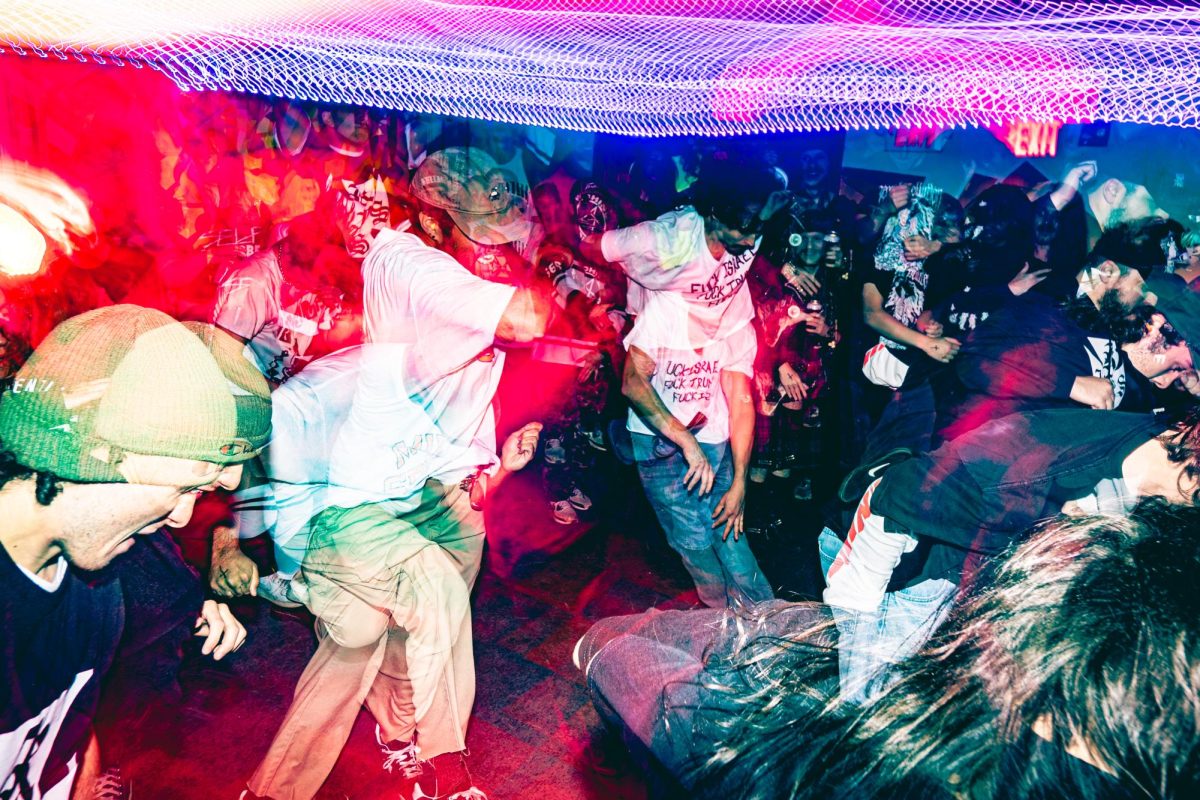If you have been on the internet for any amount of time in the past couple of days, one band has been launched into the global zeitgeist for all of the wrong reasons. The Velvet Sundown, a “band” that marketed themselves with a sleazy, country-twinged indie rock sound, blew up seemingly out of nowhere with a catalog volume that even the most locked-in musicians couldn’t even hope to replicate. Their first album was published on Spotify on June 5, 2025, and in the month since, have put out another album, re-released their second album the literal day after it originally released, featured on another band’s song and have accumulated over a million monthly listeners on the platform. Yet their meteoric rise has been almost too quick. In a video by MixbusTv, which was published on June 28, the band had over 300,000 monthly listeners. In a week, they gained over 700,000 new listeners, which would suggest that 100,000 new listeners were tuning into this band that appeared out of nowhere every day. And yet, not a single soul has ever met this band face to face. Why? They do not exist. This “band” that rose to meteoric fame is a product of generative AI.
When I first heard of this band, several alarm bells went off in my head. For starters, the biography which “they” published on their page, reeked of ChatGPT. While their biography has been changed to acknowledge the fact they don’t exist, their prior one, which can be found in the aforementioned video at this timestamp, refers to themselves as musical wizards and conjurors. They used magical metaphors to cast a spell of hallucinogenic lies to try and seem human. Their album covers also reek of generated “art.” Both Floating on Echoes and Dust and Silence feature many of the same design motifs: Both feature a staircase on a desert leading up to a singular eye in the center of the image, with a red shape at the top, accompanied by orange-twinged clouds and water, with the “band’s” name at the top left and the album name at the bottom right. Yes, continuity between album artworks can exist, but this much between two albums released within the span of two weeks raises some eyebrows. They shifted some elements from the prior two on their upcoming album, Paper Sun Rebellion, but enough exists to completely sell me on the idea that this band was made using AI.
The band was pushed on Spotify’s editorial playlists. They’ve found their music stuffed into playlists where they have no business being in, such as one with artists who were prevalent during the Vietnam War — which is quite impressive for a band who began in June 2025. Lyrics mention dust quite frequently, which John Oliver mentioned as being a red flag for AI music. Deezer flagged the band as likely having been made using artificial intelligence. Images of themselves which the band published on Instagram for meager engagement clearly were made using AI. There doesn’t even appear to be a single trace of humanity for any of their “members.” They even specifically referred to one of their artists as a “mellotron sorcerer” and not as a simple keyboardist. All of these things are damning evidence of the band being artificial. Despite this, a supposedly official Twitter account claimed the band was human, stating that “every chord, every lyric, every mistake — HUMAN.”
In the confusion, a supposed spokesperson for this “band” claimed that it was an art hoax, yet more information about this person proved that they were unaffiliated with this “band.” And during all of this, their Spotify bio was changed, with their statement saying “The Velvet Sundown is a synthetic music project guided by human creative direction, and composed, voiced, and visualized with the support of artificial intelligence.” This is a very long-winded way of saying that “we don’t actually exist, and we are nothing more than an incredibly-poor facsimile of a ‘70s band.”
The Velvet Sundown isn’t the first AI generated band to make waves on Spotify. Groups like Jet Fuel & Ginger Ales, Gutter Grinders, Savage Sons and Grunge Growlers first made waves about a year ago, Flaherty Brotherhood has also been accused of being artificially generated and Lofi has been flooded by generated slop. AI generated diss tracks have gotten to a point where Drake forced streaming platforms to remove those songs. Hell, even production wizard Timbaland revealed his creation of an AI music label and his first “artist” on it, TaTa, as well as his “collaboration” with the Notorious B.I.G., which not only sounds horrendous but is simply to fuel his own ego. Spotify has also been ramping up the number of AI features in their platform. 2024’s Spotify Wrapped was incredibly heavy in the AI department, with an AI “podcast” discussing your listening history for the past year, and the incredibly generic information which was presented. The year before, they released a “DJ,” which not only used Generative AI to provide “facts” on the artists, but also curated a list of similar music, which it isn’t really good at. When I last checked this feature out, which was as it was first rolled out and fully accidental, it gave me a Fleetwood Mac song after a 2 Live Crew track. This was so jarring, that I fully remembered this insanity.
The timing of The Velvet Sundown’s launch to stardom feels almost too perfect. Recently, Spotify CEO Daniel Ek invested over 700 million dollars in an AI weapons company. This led Deerhoof to pull all of their music from Spotify, and have encouraged other artists to do the same. Ek also announced that they wouldn’t be banning artificially generated music from the platform. Paul McCartney — after AI was used to resurrect John Lennon’s voice to make a full Beatles song in 2023 — recanted his opinions on AI and claimed that AI may take over the music industry.
Artificial “intelligence” is becoming more and more prevalent in the music industry. Why is this the case? There are two main reasons. Firstly, because these “musicians” don’t exist, they don’t have opinions. R.A.Y.D.A.R Management’s founder Ray Daniels said in a rant on Instagram that “[artists are] gonna tell you ‘I don’t wanna do that.’ Jimmy Iovene [co-founder of Interscope Records] famously told me one day ‘get you something that don’t talk back.’ What is better than an AI artist that don’t talk back?” Control is paramount in creative industries. If an artist has a vision and wants to stand up for their vision, that throws a wrench in the label’s plan. Secondly, and likely most importantly, you don’t have to pay someone that doesn’t exist. Spotify is well known for their greediness and lack of pay. On Mar. 15, 2021, a protest occurred outside Spotify Headquarters across the globe, where artists were protesting against the lack of pay. At the time, the rate was roughly 40% of one cent per stream. Even though Spotify pays less-than-pennies for each stream, they have such sway over the industry where this has become the norm.
So what can we as consumers do to protect ourselves from this rise in artificial music? On one hand, if an artist you like has material on platforms such as Bandcamp, you can support them there. Bandcamp has a higher cut for the artists — including Bandcamp Fridays, where the platform waives their cut of revenue and gives everything to the artists and labels, and you can even download the music to your devices once you purchase from them. On the other hand, being aware of trends in AI music can help you to potentially sniff out other artificially generated artists.
One of these artists which I am pretty convinced is generated is Devin Lucas. Maybe this man has mastered the Instagram algorithm, but too many things aren’t adding up. For example, this man has been haunting my Instagram feed, with seemingly every other post using one of his songs for 3 seconds. Many of these posts also have gambling sponsors like Stake advertising on them. These posts typically include a screenshot from Twitter or Tumblr, and are posted by larger meme accounts. His own verified Instagram account does the same thing, with him having 668 posts as of this article’s writing. His label is supposedly Fresh Music Marketing, which is a really real music label and not a marketing firm. Much like The Velvet Sundown, he also makes country-twinged indie music. And yet, despite how prolific his music is on Instagram, the success doesn’t translate on other platforms. On Spotify, the most streams he has on one song is less than 340 thousand. He does worse on YouTube, where the full songs have maybe 10,000 streams. He also released a music video for his song “Happy You’re With Me,” and I could count the number of blinks in this video on one hand. This supposedly takes place at a wedding, with a large “crowd” present. In addition, he also has barely any followers on Spotify but a large number of monthly listeners, which is also something that The Velvet Sundown also had. Most damning of all, his biography reads “songs I wrote in sunny New England.” Not a single New Englander would ever call that place “sunny.”
What is the next step for artificially generated bands? Truthfully I can see “artists” like Devin Lucas, where the artificiality is more hidden, rather than the brazenness of “bands” like The Velvet Sundown, becoming the norm. The backlash towards that band has been swift and severe, yet I haven’t seen anyone discussing Lucas outside of a single Reddit thread. At the end of the episode which I linked earlier, John Oliver commissioned a chainsaw-carved wooden statue of a cabbage hunk, who was showcased earlier in the episode. The artist in question, Michael Jones, has had his works ripped off by AI, and Oliver decreed that the only real way to get back at AI for stealing from humans is to create art derived from AI slop. As the audience cheered, Oliver said, “what a fun way to celebrate the destruction of our shared reality. We are fucked!” What a wonderful way to describe our own creative demise.



















